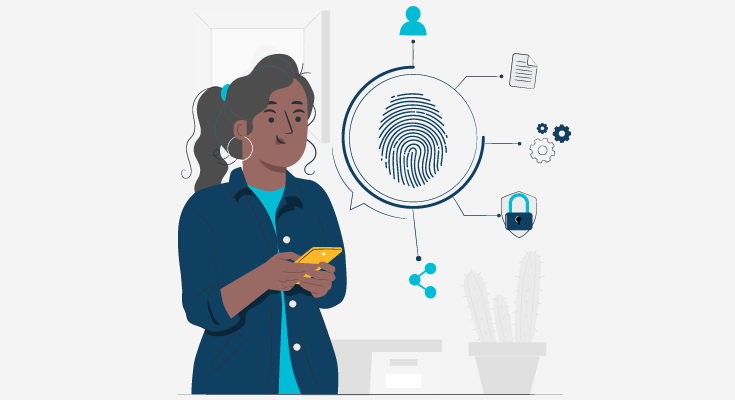In today’s world, managing financial transactions over the phone is incredibly convenient. However, the process often involves identity confirmation, which can feel like an unnecessary hassle. You might wonder, “Why do I have to verify my identity every time I make a payment?” While it may seem cumbersome, this step is vital for protecting both the consumer and the business from potential fraud. In this article, we’ll explore why identity confirmation is necessary, debunk common myths, and emphasize its role in secure financial transactions.
What is Identity Confirmation and Why is it Necessary?

Identity confirmation, also known as authentication, is a process that verifies the identity of the person initiating a transaction. This usually involves answering a series of questions or providing personal information. It’s not just an added step to complicate things—identity verification is a critical security measure. By confirming the caller’s identity, companies can ensure that sensitive financial data is accessed only by authorized individuals, reducing the risk of fraudulent activity.
The Role of Security in Phone-Based Identity Verification
Security is a cornerstone of any financial transaction, whether conducted online, in person, or over the phone. Telephonic identity confirmation protects both the customer and the business. When companies ask for identity verification, it serves as a safeguard against unauthorized access to sensitive information. By taking the time to confirm who’s on the other end of the line, companies add a layer of protection that helps prevent data breaches and fraudulent transactions.
Legitimacy of Caller Intent: Ensuring Transactions Are Genuine
Identity confirmation isn’t just about security; it also helps determine the legitimacy of a caller’s intent. In other words, verifying identity enables companies to ascertain that the individual initiating the transaction has genuine intentions. This step is crucial in preventing cases where someone might be impersonating a customer or attempting to commit fraud. Though it may feel inconvenient, it’s a small price to pay for the peace of mind that comes from knowing your financial information is safe.
How Identity Confirmation Prevents Fraud and Unauthorized Payments
One of the primary reasons companies require identity confirmation over the phone is to prevent fraud. In an era where cybercriminals can easily obtain and misuse personal information, confirming a caller’s identity is essential. By enforcing verification protocols, companies can significantly reduce the risk of unauthorized payments. This added layer of security benefits everyone involved—customers, who are protected from unauthorized charges, and businesses, which avoid potential financial losses and damage to their reputation.
Real-Life Consequences of Inadequate Identity Verification

There have been several high-profile security breaches involving phone payments, underscoring the importance of robust identity verification. For instance, the infamous Target data breach involved compromised phone and payment records, resulting in significant financial losses and reputational damage. These cases highlight the risks of inadequate security protocols, emphasizing the need for stringent identity confirmation measures to protect both consumers and companies from similar breaches.
The Myth of Benevolent Strangers Paying Your Bills
It’s a common misconception that unauthorized access to your financial account might result in someone else covering your expenses. The reality, however, is quite the opposite. In almost all cases, unauthorized access leads to fraudulent charges rather than unexpected payments in your favor. By enforcing identity confirmation, companies can ensure that every payment is legitimate and made by the rightful account owner, minimizing the risk of financial harm.
Risks of Skipping Identity Confirmation in Phone Transactions

Neglecting identity confirmation can expose both individuals and businesses to significant risks. For consumers, unauthorized transactions can lead to financial loss, reduced credit scores, and, in severe cases, identity theft. For companies, insufficient security protocols may result in legal penalties, loss of customer trust, and a tarnished reputation. By maintaining stringent identity verification procedures, companies help protect everyone involved from these potential pitfalls.
Legal and Financial Implications of Inadequate Security
The financial and legal ramifications of weak security measures can be severe. Regulatory bodies impose strict security standards to protect consumer rights and ensure that sensitive information remains secure. Failing to comply with these regulations can lead to hefty fines and legal action against businesses. By confirming identities, companies not only comply with legal requirements but also demonstrate a commitment to protecting their customers’ personal and financial data.
Consumer Protection Regulations and the Need for Compliance
Various consumer protection laws mandate the implementation of strong security measures for financial transactions. For example, the Payment Card Industry Data Security Standard (PCI DSS) requires businesses to safeguard consumer data from potential threats. These regulations often include specific guidelines for identity confirmation, making it a legal necessity for companies to verify customer identities before processing transactions over the phone.
Best Practices for Secure Phone Payments

Both businesses and consumers can take proactive steps to secure phone transactions. Here are a few best practices that help ensure safety:
- Implement Multi-Factor Authentication (MFA): MFA adds an extra layer of security by requiring multiple forms of verification, such as a password and a one-time code sent to your phone.
- Regularly Update Security Protocols: Companies should continually evaluate and update their security practices to address emerging threats.
- Employee Training: Businesses should train employees to recognize potential fraud and respond effectively.
- Encourage Account Monitoring: Consumers should regularly check their accounts for unusual activity and report any suspicious transactions immediately.
Conclusion: Why Identity Confirmation is a Necessary Safeguard
While it might feel inconvenient, identity confirmation is a critical step in securing telephonic transactions. This verification process protects customers and companies alike, ensuring that financial information remains secure and that transactions are authorized. While strangers may not be lining up to pay your bills, malicious actors are certainly looking for vulnerabilities. Thus, stringent identity verification remains a vital safeguard in today’s digital financial landscape. As technology continues to evolve, these security measures will remain essential for protecting everyone’s peace of mind.


